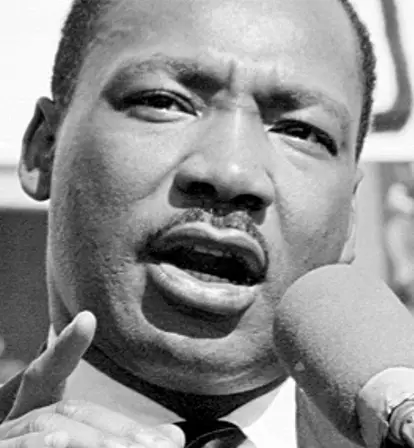These facts reveal the man behind the civil rights leader.
Most people know the basics of Martin Luther King Jr.’s life. They know that the civil rights leader bravely fought for Black Americans in the 1950s and 1960s and that he lost his life to an assassin’s bullet. But many don’t know the 27 facts about Martin Luther King Jr. listed below.
In addition to his activism, Martin Luther King Jr. had a lighthearted side. He enjoyed watching Star Trek and playing pool. But he also struggled with serious issues behind the scenes. Not only did the FBI keep close tabs on King, but the agency also once tried to convince him to kill himself.
Below, learn something new about the civil rights leader with these fascinating facts about Martin Luther King Jr.
His Original Name Was Michael King Jr.
Born on January 15, 1929, Martin Luther King Jr. started his life as Michael King Jr. He was named after his father, but when King Sr. visited Germany in the early 1930s, he decided to change his name and his son’s name to honor the Protestant Reformation leader Martin Luther, according to History.
Martin Luther King Jr. Day Doesn’t Always Fall On The Activist’s Birthday
Though the civil rights icon was born in January, and Americans celebrate Martin Luther King Jr. Day in that month, the holiday doesn’t always fall on King’s birthday. Instead, it occurs on the third Monday in January every year.
He Allegedly Attempted Suicide At 12
As Biography reports, Martin Luther King Jr. allegedly tried to kill himself when he was only 12 years old. His grandmother died while he was attending a parade against his family’s wishes, and King felt so guilty that he purportedly threw himself from a second-story window.
Martin Luther King Jr. Went To College At 15
Academically gifted, Martin Luther King Jr. skipped a couple of grades in high school and enrolled at Morehouse College in 1944 at the age of 15.
“My days in college were very exciting ones,” King later wrote, according to the King Institute. “The professors were not caught up in the clutches of state funds and could teach what they wanted with academic freedom. They encouraged us in a positive quest for a solution to racial ills.”
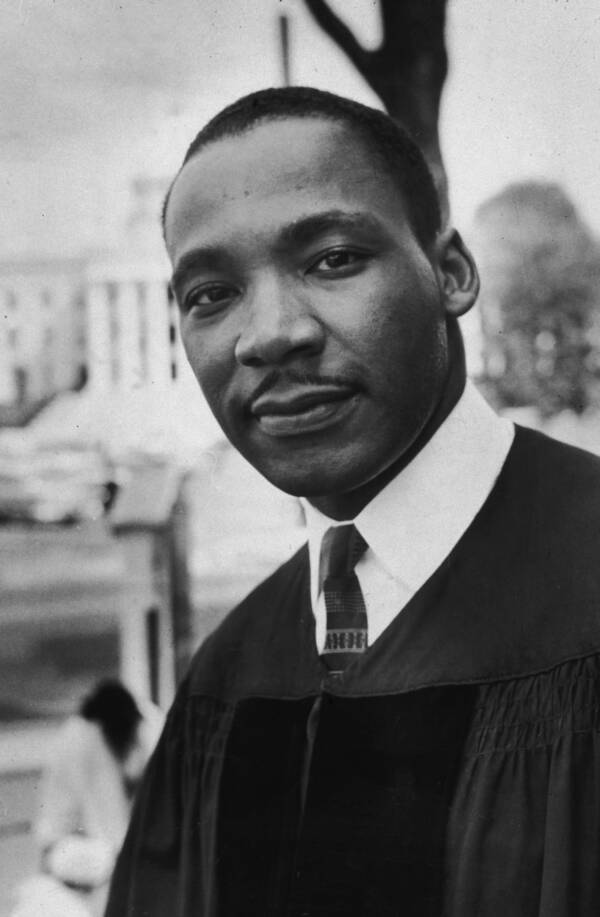
Michael Evans/New York Times Co./Getty ImagesMartin Luther King Jr. as a young man in 1953.
At Morehouse, King showed early glimmers of the civil rights leader he would become. He even sent a letter to the Atlanta Constitution, writing: “We want and are entitled to the basic rights and opportunities of American citizens.”
Martin Luther King Jr. Didn’t Always Want To Become A Minister
Though his father and grandfather were both Baptist ministers, Martin Luther King Jr. didn’t always pursue that vocation himself.
“Because of the influence of my mother and father, I guess I always had a deep urge to serve humanity, but I didn’t start out with an interest to enter the ministry,” King wrote, according to the King Institute. “I thought I could probably do it better as a lawyer or doctor.”
By his senior year in college, however, King had changed his mind.
He Became A Minister At 19
Serious about his intended path, King became an ordained Baptist minister at the age of 19. In 1948, he enrolled at Crozer Theological Seminary.
Martin Luther King Jr. Got A “C” In A Public Speaking Class
At Crozer, King — widely considered one of the best orators of the 20th century — earned a “C” in public speaking during his first year. But he later graduated as a valedictorian with straight “A”s in 1951.
Martin Luther King Jr. Officially Entered The Civil Rights Movement After Rosa Parks’ Arrest
Martin Luther King Jr. first emerged as a leader of the civil rights movement in 1955. Then, a 42-year-old activist named Rosa Parks refused to give up her seat to a white man on a segregated bus in Montgomery, Alabama. Her brave stand inspired a massive bus boycott throughout the entire city.
Black leaders and groups flocked to support Parks, including Martin Luther King Jr. Then 26 years old and a pastor at Dexter Avenue Baptist Church, King was elected as the president of the Montgomery Improvement Association (MIA). His fervent support of the boycott made him a national figure.
In December 1956, the boycott ended with a victory for the nascent civil rights movement. The Supreme Court ultimately agreed with the protesters that racially segregated buses were unconstitutional.
Martin Luther King Jr. Was An Avid Pool Player
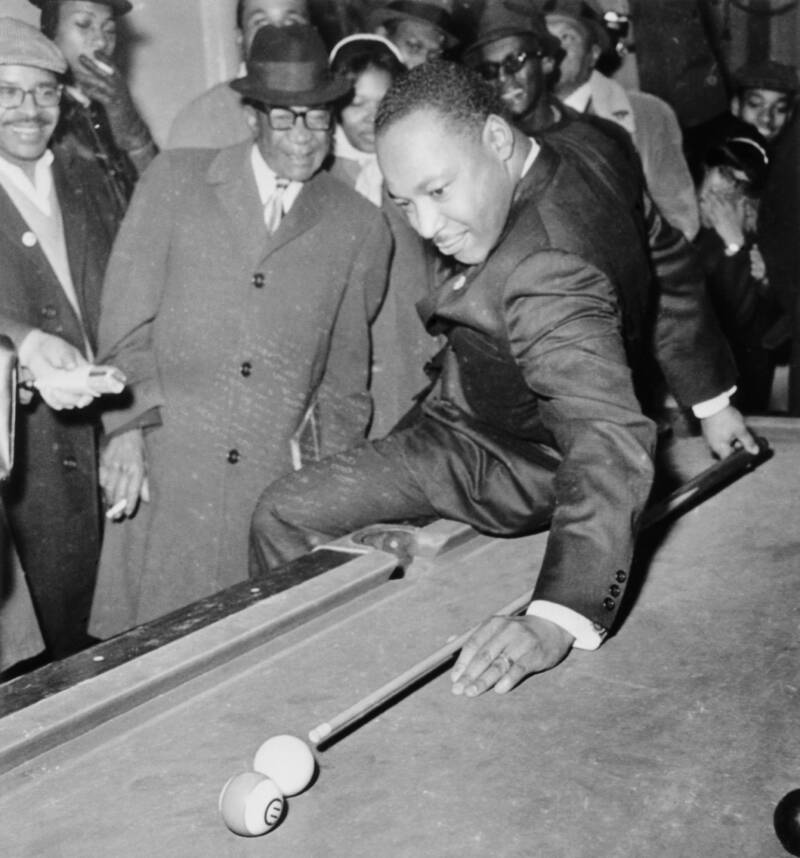
Bettmann/Getty ImagesMartin Luther King Jr. tries for a trick shot in 1966.
Though he emerged on the public stage as a minister and civil rights leader dealing with serious issues, Martin Luther King Jr. also enjoyed fun hobbies. One of the most delightful facts about Martin Luther King Jr. is that he loved playing pool — and had become a formidable player during college.
He Was A Huge Fan Of Star Trek
Martin Luther King Jr. also enjoyed watching the TV show Star Trek. He was especially supportive of actress Nichelle Nichols, who made history in the 1960s as a Black woman playing a central TV character.
In fact, when Nichols told King that she was thinking about leaving the show to pursue other opportunities, he told her that she had to stick it out.
“I was stunned,” Nichols later told NPR. “He said, ‘Don’t you understand what [Star Trek creator Gene Roddenberry] has achieved? For the first time, we are being seen the world over as we should be seen.’ [King] says, ‘Do you understand that this is the only show that my wife Coretta and I will allow our little children to stay up and watch?’ I was speechless.”
Martin Luther King Jr. Was Arrested 29 Times
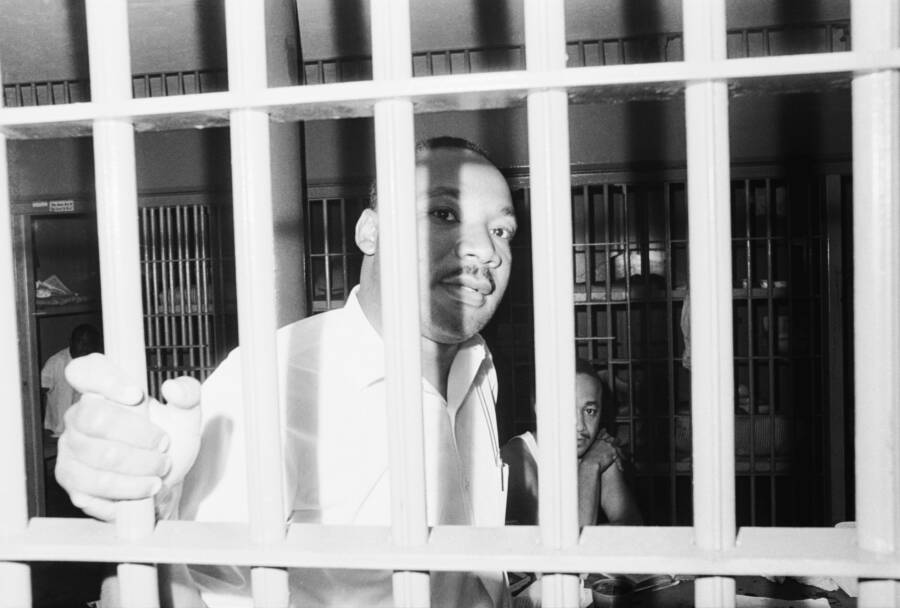
Bettmann/Getty ImagesMartin Luther King Jr. in jail in 1962. He and others had been arrested for “trespassing” at a local motel.
While fighting for civil rights, Martin Luther King Jr. was arrested 29 times. The charges against him varied and included organizing protests, disobeying a police order, and driving five miles per hour over the speed limit.
One Of His Arrests Helped President John F. Kennedy Get Elected
Interestingly enough, one of King’s many arrests may have changed the course of American history. In 1960, King was taken into custody for participating in a lunch counter sit-in at a store in Atlanta and sentenced to four months of hard labor, according to Georgia Public Broadcasting.
John F. Kennedy, then running for president, secured King’s release.
“I owe a great debt of gratitude to Sen. Kennedy and his family for this,” King said, according to Georgia Public Broadcasting. “I don’t know the details of it, but naturally, I’m very happy to know of Sen. Kennedy’s concern.”
Kennedy’s action arguably brought more Black voters to his camp, helping him to win the close 1960 election against Richard Nixon.
Martin Luther King Jr. Was Under Heavy FBI Surveillance For Years
One of the most unsettling facts about Martin Luther King Jr. has to do with the Federal Bureau of Investigation (FBI). As a prominent civil rights leader, Martin Luther King Jr. became the focus of intense FBI surveillance. Investigators wiretapped King, bugged his hotel rooms when he traveled, and paid informants to spy on him, according to NPR.
And on at least one occasion, they went even further.
The FBI Tried To Get Him To Kill Himself
In 1964, the FBI sent an anonymous letter to King suggesting that he kill himself. Referencing King’s many extramarital affairs — which the FBI had discovered through their years of surveillance — the bureau sneeringly compared the civil rights leader to King Henry VIII in the letter.
“There is only one thing left for you to do,” the letter said, in an apparent bid to get King to die by suicide. “You know what it is. You have just 34 days.”
Martin Luther King Jr. Narrowly Escaped An Assassination Attempt In 1958
The FBI wasn’t the only one who apparently wanted Martin Luther King Jr. dead. In September 1958, a decade before his assassination, King narrowly survived an attempt on his life while in New York City.
Then, King was signing copies of his book, Stride Toward Freedom, when a 42-year-old Black woman named Izola Ware Curry approached him. Curry then suddenly stabbed King in the chest, narrowly missing his aorta.
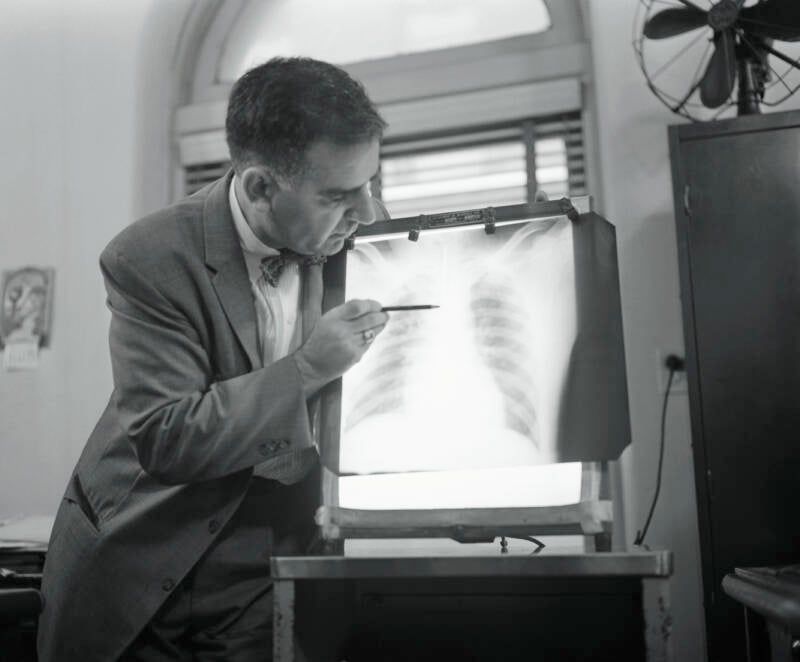
Bettmann/Getty ImagesA doctor demonstrates how close King’s would-be assassin came to killing him in 1958.
Curry, it turned out, was mentally disturbed. She spent the rest of her life being treated for paranoid schizophrenia.
Some Parts Of The Famous “I Have A Dream” Speech Were Improvised
Martin Luther King Jr. gave his “I Have A Dream” speech in Washington, D.C. on August 28, 1963. But it almost didn’t include its most iconic line.
King had used the “dream” line before, so his advisers recommended that he skip it. “Don’t use the lines about ‘I have a dream,'” adviser Wyatt Walker told him, according to The Guardian. “It’s trite, it’s cliche.”
Indeed, the final written version of King’s speech didn’t include the line. But as he was speaking to the crowd of 200,000 people, gospel singer Mahalia Jackson called out, “Tell them about the dream, Martin.”
King then inserted the line and improvised the rest of his speech.
He Was The First African American To Be Named “Person Of The Year” By Time
In January 1964, Time made history by naming Martin Luther King Jr. as their “Man of the Year” (now “Person of the Year”) for 1963. It was the first time Time had chosen a Black American, and King was outwardly pleased.
Among his inner circle, however, King took issue with Time’s article. The King Institute reports that he was annoyed that they described his style as “funereal conservatism” and said that he had “very little sense of humor.”
He Was The Youngest Person To Receive The Nobel Peace Prize In 1964
Martin Luther King Jr. was honored with the Nobel Peace Prize for his nonviolent activism against racism and prejudice in the United States in 1964. At age 35, he was the youngest person to ever receive the award at the time. (The current record belongs to Malala Yousafzai, the Pakistani female education activist who earned the award at 17.)
Martin Luther King Jr. Only Met Malcolm X Once
Though both Martin Luther King Jr. and Malcolm X were iconic figures during the civil rights movement, the two leaders only met once in 1964.
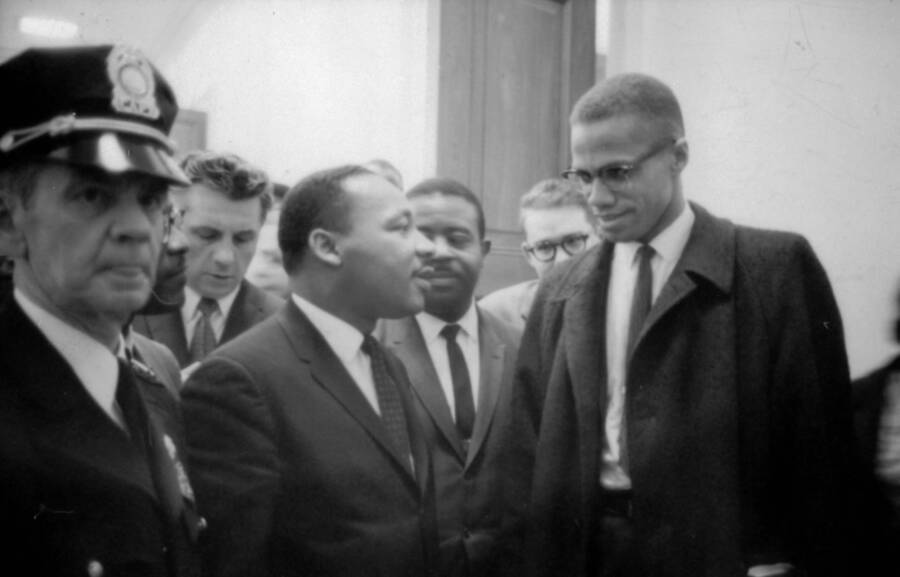
Universal History Archive/Getty ImagesMartin Luther King Jr. and Malcolm X during their first and only meeting in 1964.
For most of their careers, the two men stood on different sides of the movement. King famously preached nonviolence as a form of protest. Malcolm X argued that protesters should defend themselves. But as the years went on, the two men began to form more similar ideas.
On March 26, 1964, their paths finally crossed in Washington, D.C. Both men had come to the capital to listen to the Senate debate on the Civil Rights Act of 1964. They met in the hallway, shook hands, and exchanged a few words.
But before their potential future partnership could blossom, Malcolm X was assassinated. He was killed less than a year later in February 1965.
Martin Luther King Jr. Was Unpopular Among Many Americans During His Life
One of the most surprising facts about Martin Luther King Jr. is that while he’s venerated today, he wasn’t always popular. According to CNN, a Gallup poll in 1966 found that 63 percent of Americans viewed King unfavorably. (84 percent of Black Americans, however, had a favorable view of King in 1966.)
Most Americans continued to have a low view of the civil rights leader even after his assassination in 1968. CNN reports that 31 percent of Americans believed that King had brought his murder upon himself, and just 5 percent said that the assassination made them “angry.”
Martin Luther King Jr.’s Last Public Speech Foreshadowed His Assassination
On April 3, 1968, Martin Luther King Jr. gave his final public address — and many believe that it eerily foreshadowed his assassination the next day.
At the time, King was in Memphis, Tennessee, to support the city’s sanitation workers while they were striking. Addressing the crowd, King said: “I’ve seen the Promised Land. I may not get there with you. But I want you to know tonight, that we, as a people, will get to the Promised Land.”
Tragically, King was shot and killed the next day while standing on the balcony of the Lorraine Motel. But while a lone shooter, James Earl Ray, was found guilty of killing King, some believe that there’s more to the story.
Martin Luther King Jr.’s Family Didn’t Believe That His Assassin Acted Alone
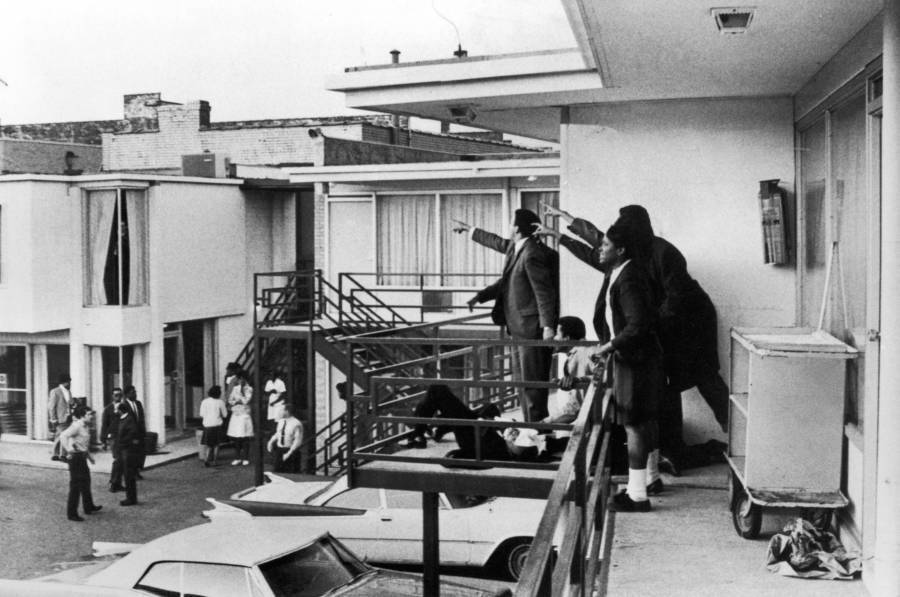
Joseph Louw/The LIFE Images Collection/Getty ImagesMartin Luther King Jr.’s associates point in the direction of the gunman after King’s assassination on April 4, 1968.
Ever since Martin Luther King Jr.’s murder, many members of his family have believed that Ray was framed — and King was killed as part of a larger plot.
“There is abundant evidence of a major high-level conspiracy in the assassination of my husband,” Coretta Scott King, King’s widow, said in 1999.
As The Washington Post reports, King’s family filed a civil suit against a possible conspirator in 1999. A judge found that the conspirator and “unknown government entities” were, indeed, liable for King’s death.
Martin Luther King Jr.’s Accused Assassin Has Also Insisted Upon His Innocence
Though James Earl Ray initially confessed to assassinating King, he quickly changed his story. Ray soon claimed that he’d only delivered a gun to a blond Cuban named “Raoul” or “Raul” and that he pled guilty to King’s death because his lawyer and the FBI insisted upon it.
Martin Luther King Jr.’s Mother Was Also Murdered By A Gunman
King’s death in 1968 was far from the only tragedy that his family suffered. In 1974, a gunman killed King’s mother, Alberta Williams King, while she was playing the organ at Ebenezer Baptist Church in Atlanta. The gunman, a Black Hebrew Israelite, allegedly wanted to kill Christians.
He’s One Of The Only Americans To Have A Federal Holiday
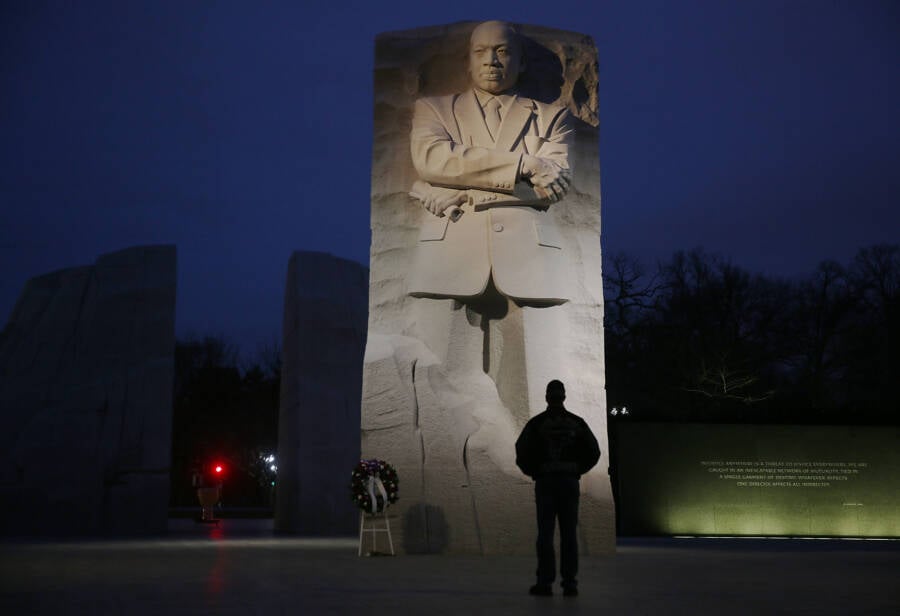
Joe Raedle/Getty ImagesThe Martin Luther King Jr. memorial in Washington, D.C.
Since his death, Martin Luther King Jr. has been honored in many different ways. For instance, he was only the second individual American to have his life honored with a federal holiday. (The first was George Washington, though his birthday is honored today with more subtlety, with Presidents’ Day.)
He Won A Posthumous Grammy Award
One of the most surprising Martin Luther King Jr. facts is that the civil rights leader was honored with a posthumous Grammy award a few years after his death. In 1971, King was awarded a Grammy for Best Spoken Word Recording for his speech “Why I Oppose The War In Vietnam.”
About 1,000 U.S. Streets Are Named For Martin Luther King Jr.
Indeed, Martin Luther King Jr.’s legacy is literally interwoven into the nation’s fabric. Today, approximately 1,000 streets in the United States bear his name.
They provide a visible representation of the profound, dramatic, and important change that King wrought during his 39 years on Earth.
After learning something new with these facts about Martin Luther King Jr., look through these stunning and inspirational photos from the civil rights movement. Or, discover the compelling stories of other civil rights leaders.
